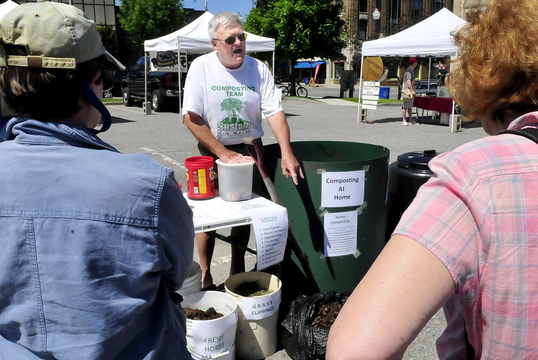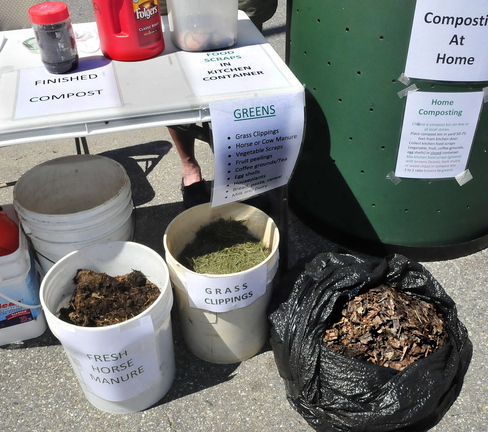Geoff Hill, 67, of Belgrade traces his interest in composting back to April 22, 1970, the very first Earth Day, when he learned about it as a way to improve the health of the planet. Fast forward 20-plus years, and he signed up for a course on composting with the University of Maine Cooperative Extension. Upon graduation, he’d earned the title of Master Composter, and he joined the Maine Compost Team, which helps coordinate composting and education efforts for state agencies.
Hill later made headlines for teaching then-Gov. John McKernan how to compost. As a regular presenter at composting workshops and farmers markets, Hill has preached the virtues of composting to hundreds. We called him recently to ask about composting lobster shells, schooling McKernan and the future of composting.
REDUCING YOUR WASTE: The average household can subtract 15 to 30 percent from their household waste by composting their kitchen scraps. “We talk a lot about recycling our paper and metal or plastic,” he said, “but we don’t talk as much about our food waste.”
HOW TO GET STARTED: “It can be very simple. Collect your vegetable and fruit waste and mix it with something as simple as leaves and grass clippings. Don’t mess with meat. Don’t mess with fish waste.”
MOST COMMON COMPOSTING MISTAKE: “Some people throw their food scraps in a pile outside their home and expect it to compost, but it just rots. You really need yard waste, like leaves, to provide that carbon.” Also …
DANGER, DANGER: “Occasionally, someone makes a mistake and either puts in dog or cat waste or cat litter. That should not go in because dogs and cats eat meat. Any animal that’s a carnivore, you don’t want to mix their waste into your compost pile, if you’re going to use your finished compost for a vegetable garden.”
THE GREAT COMPOSTING DEBATE: Some experts say compost is best when it’s derived from leaf litter alone – no kitchen scraps needed. Not Hill. “I don’t agree with that at all,” he says. “My purpose is to recycle as much of the waste stream as possible. If you only compost the leaves, it’s missing ingredients. To me, mix in the food waste and the coffee grounds and the eggshells – it increases the nitrogen content of your compost, which in turn increases the nitrogen content in your vegetables. That’s a better thing.”
IN-STATE ADVANTAGE: “We have plenty of leaves in Maine.”
SURPRISING COMPOSTABLE MATERIAL: Ground-up shellfish, including lobster shells, crab shells and mussel shells. Hill said some operations Down East mix them with sawdust for an extra calcium kick.
EVEN MORE SURPRISING COMPOSTABLE MATERIAL: An operation in Unity turns sewage sludge into compost. It gets its raw material from area communities and mixes the sludge with sawdust in large cubicles heated to 160 degrees with forced air. “They have a bucket loader that helps to turn the rows and you can see the steam coming off, it’s so hot.” Compost from human waste, Hill said, should not be used on a vegetable garden, but it can be used to grow grass, hay, ornamental plants or fruit trees.
ER, CAN VEGANS OR VEGETARIANS COMPOST THEIR OWN WASTE FOR GARDENS? No way. Whether they eat meat or not, E. coli “bacteria is an integral part of our bodies,” which is just one of many bacterial concerns.
HOW TO SEPARATE FINISHED COMPOST FROM THE NEW STUFF IN THE BIN? “It’s an interesting problem. The more questions you ask, it gets more complicated, doesn’t it? I have two compost bins. When one is pretty much filled up, I let that one sit and I start with my second.” Also, some bins have drawers in the bottom that allow for removal of the finished product.
THE MASTER’S OWN COMPOST? Hill doesn’t have a vegetable garden himself, so he ships it to the garden of a friend, and gets his pick of tomatoes in exchange.
ON TEACHING FORMER GOV. McKERNAN TO COMPOST: “People gave me a hard time about that: ‘Photo op, photo op.’ I don’t care if it’s a photo op or not. They asked me and I went, just to get the message out.”
IS McKERNAN STILL COMPOSTING? I’d love to know that. I suppose I could call him and say, ‘By the way John, this is Geoff. Are you still composting?’ He’d say ‘Geoff who?’ ”
THE FUTURE OF COMPOSTING: As pressures mount to minimize the waste stream, Hill believes that more and more people will compost, just as they now recycle. “Massachusetts just enacted a law that businesses that produce more than a certain amount of food tonnage have to find a way to compost it, to keep it out of landfills.”
NEXT STAR TURN: Hill will be collecting compostables and answering questions during his next public appearance, at Taste of Waterville on Main Street on Aug. 6. The food waste collected during the event will be brought to Rainbow Valley Farm in Sidney.
Send questions/comments to the editors.




Comments are no longer available on this story